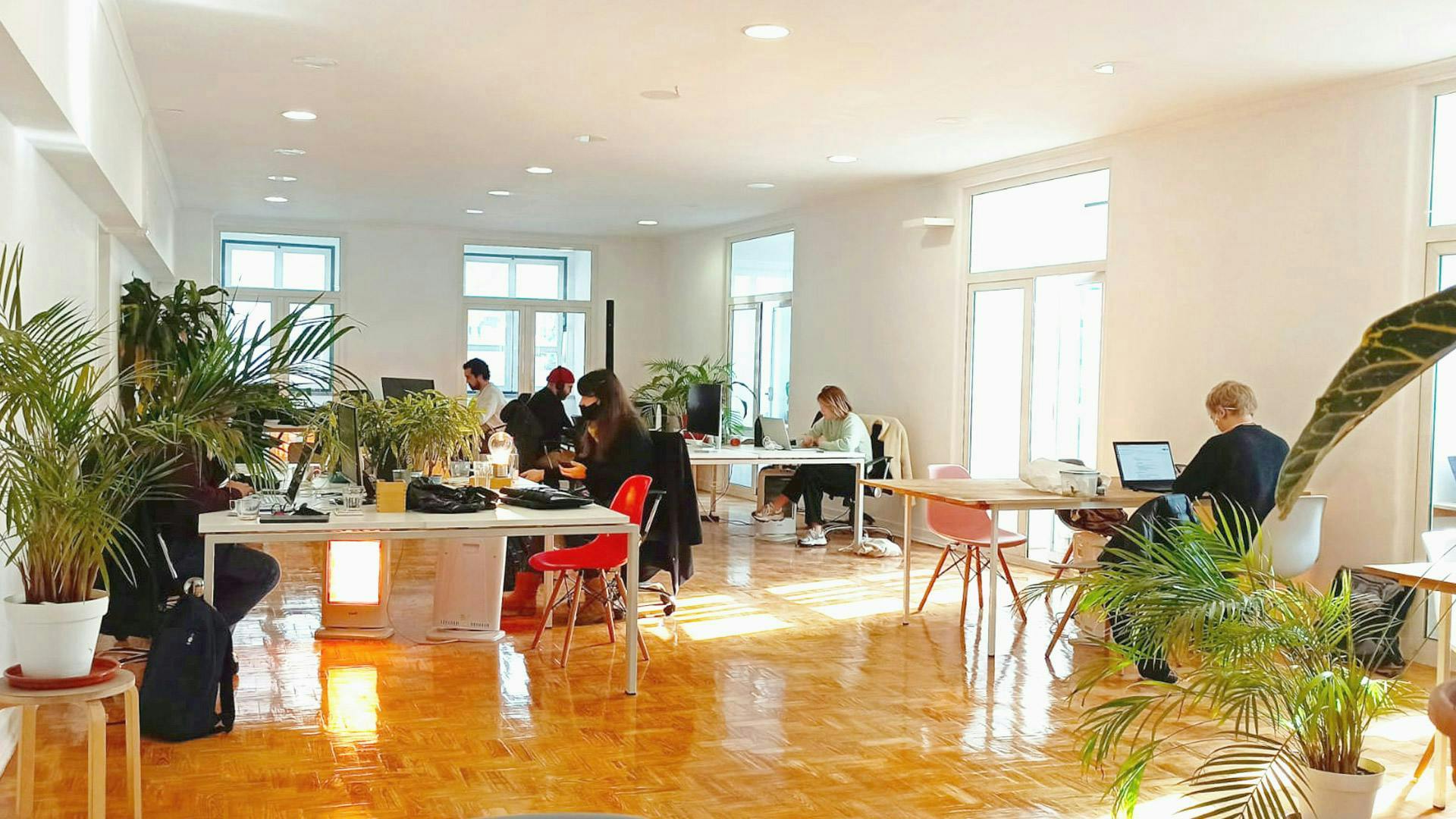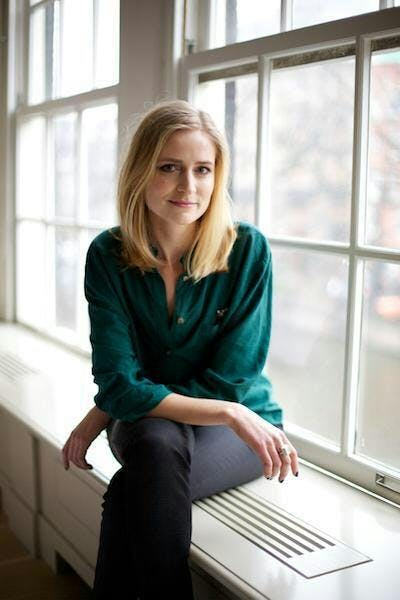How a shift from coworking space to online programs supported Impact Hub Lisbon’s growth
mpact Hub Lisbon was building a strong community in its coworking space until it was forced to close its doors when COVID-19 hit. But while the pandemic was disastrous for many organizations, Impact Hub Lisbon had its best year yet in 2020. Its success is a result of quickly pivoting from space-based activities to service-based activities. Now, instead of serving the local coworking community, it has built and supported an online community of over 400 entrepreneurs through its acceleration programs.
Community is key
Impact Hub’s global mission is to put community first and create an international entrepreneurial network for positive impact. Each location has its own management, focus and initiatives but broadly speaking, community-building activities fall into two areas: space-based activities including events and coworking space, and service-oriented activities such as innovation consultancy and acceleration programs. The latter means designing programs with external partners and institutions (corporate clients, government and foundations). These programs allow entrepreneurs to connect with external partners and receive business support to grow their entrepreneurial projects.
When Impact Hub Lisbon opened in 2016, the organization had a small office space and just two programs. In the first years, the focus was on building a community through the coworking space and events. People from all over the world came together to meet other remote workers, digital nomads and social entrepreneurs.
General manager Francesco Rocca says that the Lisbon location started off as a coworking space with a small but strong community, but explains that the focus has since shifted and that programs are now the main driver of community. The pandemic was an unexpected catalyst for this progression.
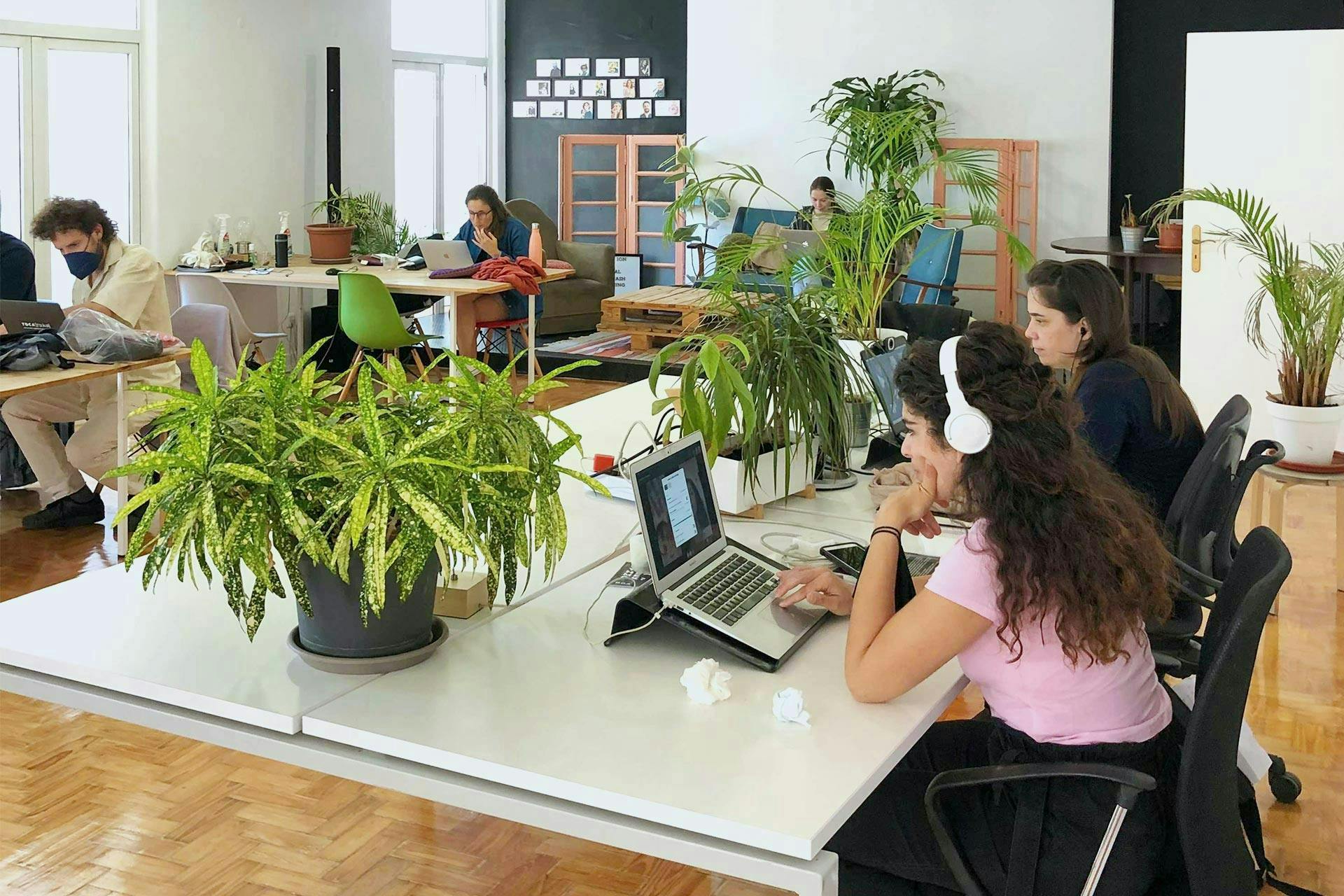
Impact Hub Lisbon. Photo: Masoud Saedi and Filipa Marques
Moving a community online
When COVID-19 hit Portugal, coworking spaces had to close their doors. But while Impact Hub closed its physical space, it remained open virtually through Zoom-based coffee breaks, regular communication through Slack and, perhaps most importantly, moving acceleration programs online.
Francesco says that some other established coworking spaces failed in the pandemic because their focus was on the physical space. “Their community was kind of an accessory and their asset is the building. For us, the asset is the person,” he says. Impact Hub looked at what its members needed and sought to provide it: before the pandemic, they needed a space but during the crisis they needed support for their entrepreneurial projects and community more than ever.
Masoud Saedi, community manager, joined Impact Hub just before the pandemic hit. He has made a dedicated effort to move the community from a physical, local one to a virtual, global one, which has brought challenges. Rather than welcoming members to a physical space, he now supports more than 400 members digitally, answering their administrative questions and offering support in other ways than providing a desk.
Impact is in our DNA. It’s not a way to sell more – it’s the only thing we sell.
Focusing on programs
In its first first years, Impact Hub had just a few programs but Francesco and Masoud knew that they needed to focus on this side of activities to remain operational and relevant in the pandemic.
Impact Hub Lisbon now provides online packages for startups in the European Union. The organization offers startups support in getting set up in Portugal, and also provides other services such as help with obtaining a visa for non-EU citizens. It has attracted startups from Russia, Iran, Mexico and the UK among others.
Introducing program attendees to the existing community and making sure they feel included and connected is another challenge. The synergy between the existing members and the program attendees is still shifting but both Masoud and Francesco are positive about this new direction. They work closely with program managers, who know their attendees best, to provide useful support and are constantly evaluating how to best communicate online with the still-growing community.
By quickly adapting and expanding its services, Impact Hub Lisbon has made community and programs its unique selling point over coworking space. Even now the physical space is open again, the online community is the backbone of operations.
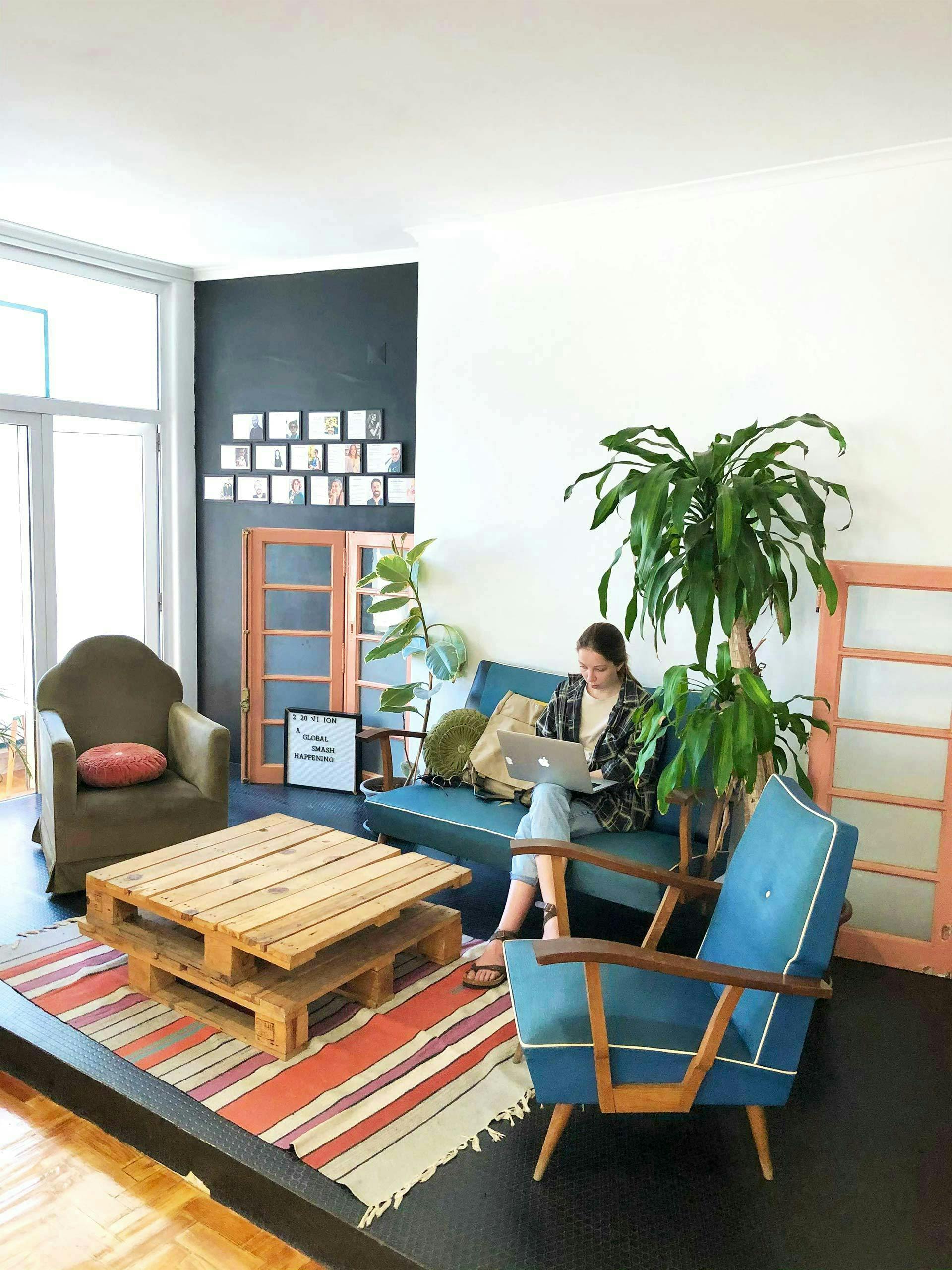
Impact Hub Lisbon. Photo: Masoud Saedi and Filipa Marques
Supporting female entrepreneurs
One of Impact Hub’s first clients was Coca-Cola, and together they designed Bora Mulheres: a program that empowers female entrepreneurs. In 2020, they organized a second edition and aim to continue the program for years to come.
Francesco says that community is at the heart of the Bora Mulheres program and that female entrepreneurs are all about collaborating, empowering each other and developing ideas for the collective. “We build the community so that it’s active and engaged, but it’s the community that feeds itself. The entrepreneurs grow because they’re together,” he says.
Portugal only has a few programs focused on female founders, such as the HeForShe and Portuguese Women in Tech, so Bora Mulheres is providing a much-needed service. Franceso says that everything you invest in women returns to the community. He notes some differences that he has observed: that women work better in teams, showing less ego and more innovation; that women design for everyone, not just men; and that women tend to make better use of their money and invest for the collective good.
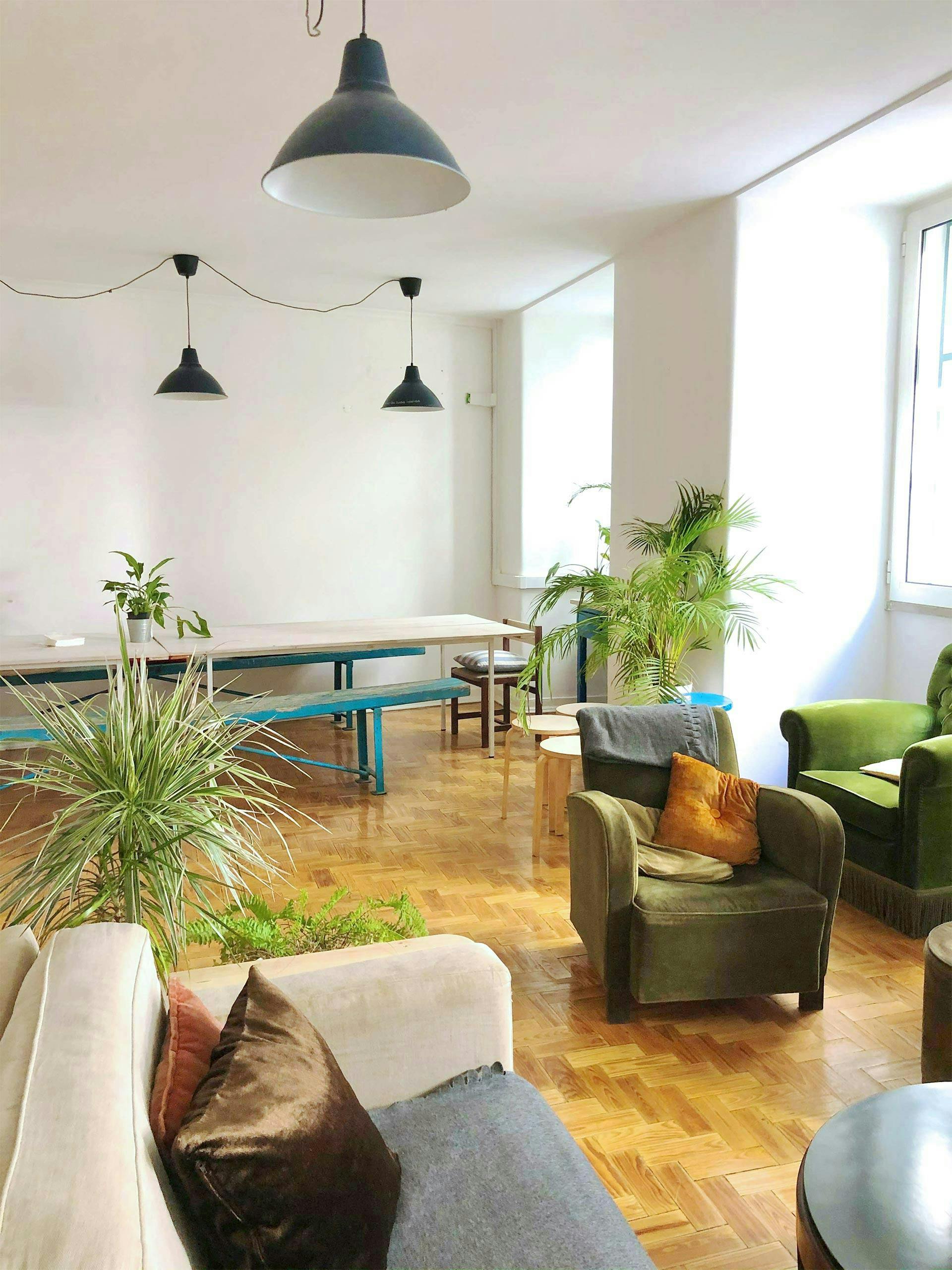
Impact Hub Lisbon. Photo: Masoud Saedi and Filipa Marques
Seeing impact as investment
In the first years of Impact Hub Lisbon, Francesco perceived that clients wanted to connect to the startup ecosystem to tap into the innovation potential. Now, after Impact Hub Lisbon has demonstrated its ability to create successful impactful programs such as Bora Mulheres, partners are more open to working collaboratively with the ecosystem. He also says that more Portuguese companies want to incorporate sustainability and social impact in their business.
“Impact is in our DNA. It’s not a way to sell more – it’s the only thing we sell. That’s why they want to work with us. We envision that impact and sustainability should happen through entrepreneurship and that’s Impact Hub’s vehicle,” Francesco says.
Francesco noticed that in Impact Hub Lisbon’s early days, lots of clients wanted to create programs to support early-stage startups and finance the ecosystem with a philanthropic approach. During the pandemic, he noticed that the organizations that stopped investing were the ones that saw sustainability as a cost. Those who saw it as added value continued to invest and took the pandemic as an opportunity to make more change.
Francesco opines that in the long term, the organizations that are truly committed to making impact and that incorporate it into their activities will be the ones that survive. In 2020, EY, Beyer and the US Embassy created programs with Impact Hub Lisbon.
Written by Daphne Frühmann.
Edited by Hazel Boydell.
Main photo: Masoud Saedi and Filipa Marques
